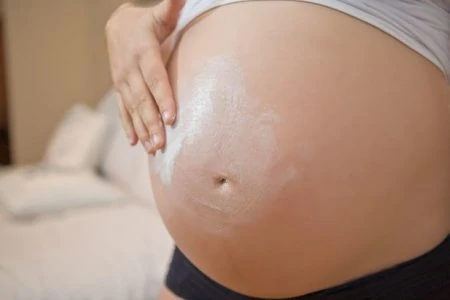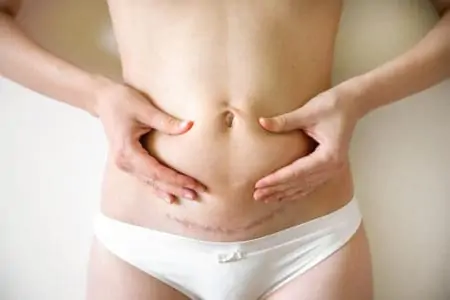Have you noticed your hair becoming thicker since becoming pregnant? Are your hairy legs giving Chewbacca a run for his money?
One of the first things my mother told me when I told her I was pregnant was, “You’re going to love it. Your hair is going to look so gorgeous.”
It’s a common old wives’ tale, but it seems to be a true one. It’s common for hair to grow faster on your legs, underarms, and even in new places.
In this article, we’ll discuss what causes extra hair growth during pregnancy and what you can safely do to get rid of any unwanted hair.
Key Takeaways
- Hair growth increases during pregnancy due to higher estrogen levels.
- Waxing, sugaring, epilators, and shaving are considered safe hair removal methods during pregnancy.
- Depilatory creams and laser hair removal are not proven safe during pregnancy, and it’s best to avoid them.
- Unwanted hair typically falls out within months after giving birth due to a decline in hormones.
What Causes Hair Growth During Pregnancy
During pregnancy, your estrogen levels will rise to help your uterus grow and increase blood flow to your baby. It also helps trigger several of your baby’s organs to grow and develop, and it stimulates the growth of your baby’s adrenal gland and hormone production.
It often also has the fortunate side effect of helping your hair and nails grow faster and healthier (1).
But while thick, lustrous hair on your head is the stuff of many women’s dreams, hair that grows elsewhere may not be. So what can we safely do about unwanted hair growth during pregnancy?
Treatments for Body Hair Growth During Pregnancy
Here are some things you can do to get rid of that unsightly body hair — and our safety rating for each one.
1. Waxing and Sugaring — Safe
Waxing and sugaring are some of the oldest hair removal methods, with sugaring going back to ancient Egypt. Both work by spreading the substance onto the skin and tearing it off to rip out patches of hair at its roots.
While both waxing and sugaring are considered safe for pregnant women, beware that they might cause more pain than you are used to.
Estrogen, the same hormone that causes increased hair growth, also causes your skin to become more sensitive as your body’s blood flow increases. With your doctor’s permission, you can take acetaminophen an hour or so before you wax to help with the pain and discomfort (2).
Although waxing and sugaring are both considered safe to do during pregnancy, there are some instances where you should avoid them.
Don't Do It If
2. Epilators — Safe
Epilators, created in the 1980s, are small electronic devices that pull unwanted hair out at its root. Like waxing, epilators pull out several hairs at one time.
Many women use them because they are less messy than waxing or sugaring and do not come with the chance of cutting yourself like shaving.
Epilators can be painful, even without being pregnant, although many say the pain lessens over time as the hair grows back thinner after several uses.
It is safe to use an epilator while pregnant, but it might be more painful than when you’re not pregnant. As with waxing and sugaring, your skin can become more sensitive while pregnant, making it hurt more when the hairs are ripped out.
3. Shaving — Safe
Shaving became popular in the 1940s when nylon stockings were in short supply due to war efforts. The process involves using a razor to cut the hair at the base of the skin. Because the hair is not pulled out at its root, it grows back faster than with other options like waxing or using an epilator.
Shaving is one of the safest options for hair removal during pregnancy, but you should still take some precautions. Because your balance can be affected during pregnancy, make sure to sit in the bath or on the edge of the tub (3).
A good, soothing shaving gel is also recommended to ward off any nicks and cuts. And if you’re prone to razor burn, try soaking the area in warm water before shaving, and then apply cool compresses afterward, followed by a non-scented lotion to limit any irritation.
4. Depilatory Creams — Safety Unknown
With the pain that can come with waxing or epilators or the fear of nicks and cuts while shaving, depilatory creams can seem like an easy and pain-free way to get rid of unwanted hair.
Unfortunately, it is recommended you hold off on this option until after your baby is born. While depilatory creams have not been proven unsafe during pregnancy, they have not been proven safe either. That’s because of the active chemical ingredients used to make your hair dissolve and the strong odors it can give off when in use.
If you don’t want to give up your depilatory cream entirely during pregnancy, we recommend that you hold off until at least your second trimester.
Why You Don't Want To Do It In The First Trimester
5. Laser Hair Removal — Safety Unknown
Laser hair removal is a method that seems to become more popular each year. Who wouldn’t want permanent hair removal?
However, it’s best to err on the side of caution and wait until after your baby is born to try this method.
Like with depilatory creams, there are no studies to show if laser hair removal during pregnancy is safe. But what is known is that your body produces more melanin while you’re pregnant, and laser hair removal during this time can cause permanent skin discoloration.
On top of that, laser hair removal can be costly, and it takes several sessions to remove hair permanently.
Since the unwanted hair goes away within months of delivery, you may want to skip this treatment during pregnancy.
Don’t rush to remove hair through expensive means shortly after delivering. The hair often falls out after your baby is born due to the sudden hormone decline after you give birth.
FAQs
The Bottom Line
While some extra hair growth during pregnancy is welcomed, not all of it is. Thankfully, there are safe options for hair removal during pregnancy.
Whatever method you choose to keep your unwanted hair at bay, take these necessary precautions to keep you and your baby safe:
- Don’t wax or sugar areas with open cuts, varicose veins, or rashes.
- Shave in the tub or on the side of the tub to prevent yourself from falling.
- Wait until at least your second trimester to use depilatory creams, or avoid them altogether.









